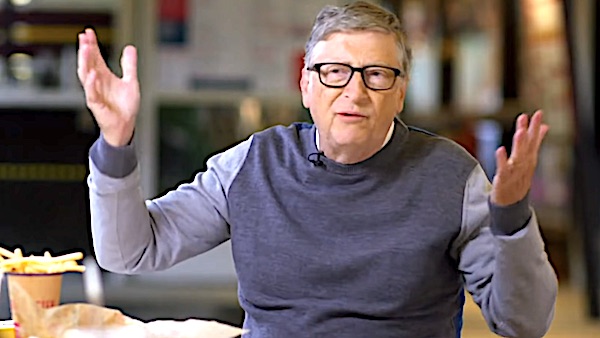|
Getting your Trinity Audio player ready...
|
(Becker News) Bill Gates, billionaire “philanthropist” and Microsoft co-founder, is urging countries globally to embrace his plan for “digital ID,” aiming for everyone to “proves their identity.”
On Twitter/X, he highlighted that “850 million people” worldwide still “lack ID that proves their identity.”
850 million people lack ID that proves their identity. As a result, they’re shut out of a lot of services that could change their lives.
That’s why I’m so excited about MOSIP, an open-source technology that could dismantle barriers worldwide. #G20India https://t.co/GmDyic591S
— Bill Gates (@BillGates) August 21, 2023
He championed the Modular Open-Source Identification Platform (MOSIP) as the global solution to provide digital IDs for all. Gates views MOSIP as an “inclusive approach” to a “global digital ID system,” calling it “a formidable solution” for “dismantling the barriers” facing countless individuals without proper identification.
Following this, the Bill & Melinda Gates Foundation has invested $10 million in MOSIP. Moreover, the Gates Foundation collaborates with the United Nations’ Sustainable Development Goals to further this technology.
The primary objective of the Gates Foundation is advancing a universal digital identification system. While the initial pitch is for low to middle-income countries, the vision is global. Nevertheless, MOSIP faces criticism from privacy experts.
There are reservations about the wider repercussions of such an extensive digital ID system. Historically, technological progress has sometimes been a double-edged sword, especially concerning privacy. Concerns also arise over potential societal exclusion for those not adopting the system or being blocked from it.
The inspiration behind MOSIP seems to be India’s state digital ID, Aadhaar, introduced in 2009. Despite global interest in Aadhaar, its challenges prompted countries to consider potentially costly and opaque commercial systems, leading to issues like “vendor lock-in” and potential data misuse.
Emerging in 2018, MOSIP addresses these concerns, emphasizing its adaptability to different nations. Gates, the UN, and MOSIP supporters label it as the “inclusive” solution. The Philippines pioneered its adoption, with 11 African nations joining. To date, over 90 million digital IDs have been issued in the Philippines, Ethiopia, and Morocco.
However, the vast data collection presents evident risks. Customizing MOSIP for every nation means handling enormous personal data. With an 80+ vendor ecosystem, data breach vulnerabilities grow. While MOSIP provides training and certification, managing multiple vendors poses data security challenges. Aiming to register a billion people in the next ten years only heightens these concerns.
The Gates Foundation sees digital IDs as crucial for developing digital public infrastructure (DPI). DPI supporters believe in its potential for economic growth. But, privacy threats can’t be downplayed. If digital ID becomes mandatory for daily tasks, it could exclude those not adhering to regulations. For instance, a social media mishap might deny someone public transport access.
Reports indicate global entities like the World Economic Forum (WEF) have been promoting “cashless societies” and digital ID “benefits.” The UN even suggests linking digital IDs to bank accounts, similar to the WEF’s system. As per three UN policy briefs, the goal is to support UN Secretary-General Antonio Guterres’s future “vision,” set to be endorsed in September 2024 at “The Summit for the Future.”
The report states: “Digital IDs linked with banking can enhance social protection delivery. They might cut down errors, costs, and program inefficiencies.”
Furthermore, the WEF recently partnered with biometrics firm Fingerprint Cards to push its digitization efforts. Fingerprint Cards has joined the WEF’s New Champions Community. The WEF emphasizes biometric digital ID for “social inclusion.”




